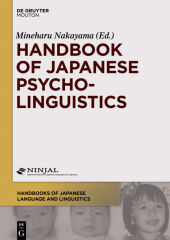 Neuerscheinungen 2015Stand: 2020-02-01 |
Schnellsuche
ISBN/Stichwort/Autor
|
Herderstraße 10
10625 Berlin
Tel.: 030 315 714 16
Fax 030 315 714 14
info@buchspektrum.de |

Mineharu Nakayama
Handbook of Japanese Psycholinguistics
Ed.: Nakayama, Mineharu
2015. XLIII, 635 S. 240 mm
Verlag/Jahr: DE GRUYTER; DE GRUYTER MOUTON 2015
ISBN: 1-61451-165-9 (1614511659)
Neue ISBN: 978-1-61451-165-6 (9781614511656)
Preis und Lieferzeit: Bitte klicken
The studies of the Japanese language and psycholinguistics have advanced quite significantly in the last half century thanks to the progress in the study of cognition and brain mechanisms associated with language acquisition, use, and disorders, and in particular, because of technological developments in experimental techniques employed in psycholinguistic studies. This volume contains 18 chapters that discuss our brain functions, specifically, the process of Japanese language acquisition - how we acquire/learn the Japanese language as a first/second language - and the mechanism of Japanese language perception and production - how we comprehend/produce the Japanese language. In turn we address the limitations of our current understanding of the language acquisition process and perception/production mechanism. Issues for future research on language acquisition and processing by users of the Japanese language are also presented. Chapter titles 1. Learning to become a native listener of Japanese (Reiko Mazuka) 2. The nature of the count/mass distinction in Japanese (Mutsumi Imai & Junko Kanero) 3. Grammatical deficits in Japanese children with Specific Language Impairment (Shinji Fukuda, Suzy E. Fukuda, & Tomohiko Ito) 4. Root infinitive analogues in Child Japanese (Keiko Murasugi) 5. Acquisition of scope (Takuya Goro) 6. Narrative development in L1 Japanese (Masahiko Minami) 7. L2 acquisition of Japanese (Yasuhiro Shirai) 8. The modularity of grammar in L2 acquisition (Mineharu Nakayama & Noriko Yoshimura) 9. Tense and aspect in Japanese as a second language (Alison Gabriele& Mamori Sugita Hughes) 10. Language acquisition and brain development: Cortical processing of a foreign language (Hiroko Hagiwara) 11. Resolution of branching ambiguity in speech (Yuki Hirose) 12. The role of learning in theories of English and Japanese sentence processing (Franklin Chang) 13. Experimental syntax: word order in sentence processing (Masatoshi Koizumi) 14. Relative clause processing in Japanese: psycholinguistic investigation into typological differences (Baris Kahraman & Hiromu Sakai) 15. Processing of syntactic and semantic information in the human brain: evidence from ERP studies in Japanese. (Tsutomu Sakamoto) 16. Issues in L2 Japanese sentence processing: similarities/differences with L1 and individual differences in working memory (Koichi Sawasaki & Akiko Kashiwagi-Wood) 17. Sentence production models to consider for L2 Japanese sentence production research (Noriko Iwasaki) 18. Processing of the Japanese language by native Chinese speakers (Katsuo Tamaoka)
This handbook represents the state-of-the-art in the scientific study of Japanese. This is essential reading for anyone interested in how children acquire Japanese or in the mechanisms used by adult speakers to comprehend and produce Japanese. The chapters are written for a wide audience by prominent scholars. Stephen Crain, Professor of Linguistics, Macquarie University This highly professional handbook presents findings and issues in the acquisition and processing of Japanese that have important implications for the general theory. It is impressive in its scope, covering topics ranging from infant´s development in perception to sentence processing by L2 speakers of Japanese. It is a valuable resource for anyone investigating language as a component of the mind/brain. Mamoru Saito, Professor, Department of Anthropology and Philosophy, Nanzan UniversityThe topics selected for this volume, e.g. early language perception, count-mass distinction, root infinitives, quantifier scope, relative clause processing, are all of current theoretical interest for any psycholinguist interested in how abstract properties of language are acquired and processed. This volume, which reports state-of-the-art findings from competing paradigms, will be of immense value to scholars working on East Asian languages.Thomas Hun-tak Lee, Professor, Department of Linguistics and Modern Languages, The Chinese University of Hong Kong


